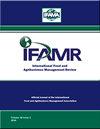The role of information heterogeneity in blockchain-based traceability systems: evidence from fresh fruits buyers in China
IF 1.5
4区 经济学
Q3 AGRICULTURAL ECONOMICS & POLICY
International Food and Agribusiness Management Review
Pub Date : 2023-06-22
DOI:10.22434/ifamr2022.0080
引用次数: 0
Abstract
Blockchain technology is now being piloted to agri-food traceability systems to restore consumers’ confidence for food quality and safety. It is important for the industry to understand what information to be recorded and tracked in blockchain-based fresh produce traceability systems to meet consumers’ preferences for information. Yet little research has focused specifically on consumers’ preferences concerning information attributes traced by this new blockchain technology. This study conducts a best-worst scaling experiment with fresh fruit buyers in China to investigate consumers’ preference and perceived value regarding sixteen information attributes about blockchain-based fresh fruit traceability systems. The results from the analysis of a random parameter logit model reveal that consumers consistently rank testing information as the first-most valuable attribute, followed by production inputs (pesticides and fertilizers), quality certification and grades information attributes, while supplier and logistics information are considered to be the least valuable traceability one. Furthermore, there exist significant heterogeneity in relative value placed on traceable information attributes. The findings identify four different consumer segments by using a latent class modelling approach: (1) sensitivity for authoritative information, (2) preferences for comprehensive information, (3) information preferences equally, and (4) preferences for production inputs information. Preference heterogeneity is mainly explained by risk attitude, risk perception, information concern, traceability cognition, gender and other factors. The findings from this study can provide stakeholders and policymakers with certain insights as well as strategies on information provision and disclosure for fresh produce blockchain-based traceability.信息异质性在基于区块链的可追溯系统中的作用:来自中国新鲜水果买家的证据
区块链技术目前正在农业食品可追溯系统中进行试点,以恢复消费者对食品质量和安全的信心。对于行业来说,重要的是要了解在基于区块链的生鲜农产品可追溯系统中需要记录和跟踪哪些信息,以满足消费者对信息的偏好。然而,很少有研究专门关注消费者对这种新的区块链技术所追踪的信息属性的偏好。本研究对中国的新鲜水果买家进行了最佳-最差尺度实验,以调查消费者对基于区块链的新鲜水果可追溯系统的16个信息属性的偏好和感知价值。随机参数logit模型分析结果显示,消费者一致将检测信息列为最有价值的属性,其次是生产投入(农药和化肥)、质量认证和等级信息属性,而供应商和物流信息被认为是最没有价值的可追溯性属性。此外,可追溯信息属性的相对价值存在显著的异质性。研究结果通过使用潜在类别建模方法确定了四种不同的消费者群体:(1)对权威信息的敏感性,(2)对综合信息的偏好,(3)对同等信息的偏好,以及(4)对生产投入信息的偏好。偏好异质性主要由风险态度、风险感知、信息关注、可追溯性认知、性别等因素解释。这项研究的结果可以为利益相关者和政策制定者提供某些见解以及基于区块链的生鲜农产品可追溯性的信息提供和披露策略。
本文章由计算机程序翻译,如有差异,请以英文原文为准。
求助全文
约1分钟内获得全文
求助全文
来源期刊

International Food and Agribusiness Management Review
AGRICULTURAL ECONOMICS & POLICY-
CiteScore
2.90
自引率
0.00%
发文量
0
审稿时长
>12 weeks
期刊介绍:
The IFAMR is an internationally recognized catalyst for discussion and inquiry on issues related to the global food and agribusiness system. The journal provides an intellectual meeting place for industry executives, managers, scholars and practitioners interested in the effective management of agribusiness firms and organizations.
IFAMR publishes high quality, peer reviewed, scholarly articles on topics related to the practice of management in the food and agribusiness industry. The Journal provides managers, researchers and teachers a forum where they can publish and acquire research results, new ideas, applications of new knowledge, and discussions of issues important to the worldwide food and agribusiness system. The Review is published electronically on this website.
The core values of the Review are as follows: excellent academic contributions; fast, thorough, and detailed peer reviews; building human capital through the development of good writing skills in scholars and students; broad international representation among authors, editors, and reviewers; a showcase for IFAMA’s unique industry-scholar relationship, and a facilitator of international debate, networking, and research in agribusiness.
The Review welcomes scholarly articles on business, public policy, law and education pertaining to the global food system. Articles may be applied or theoretical, but must relevant to managers or management scholars studies, industry interviews, and book reviews are also welcome.
 求助内容:
求助内容: 应助结果提醒方式:
应助结果提醒方式:


